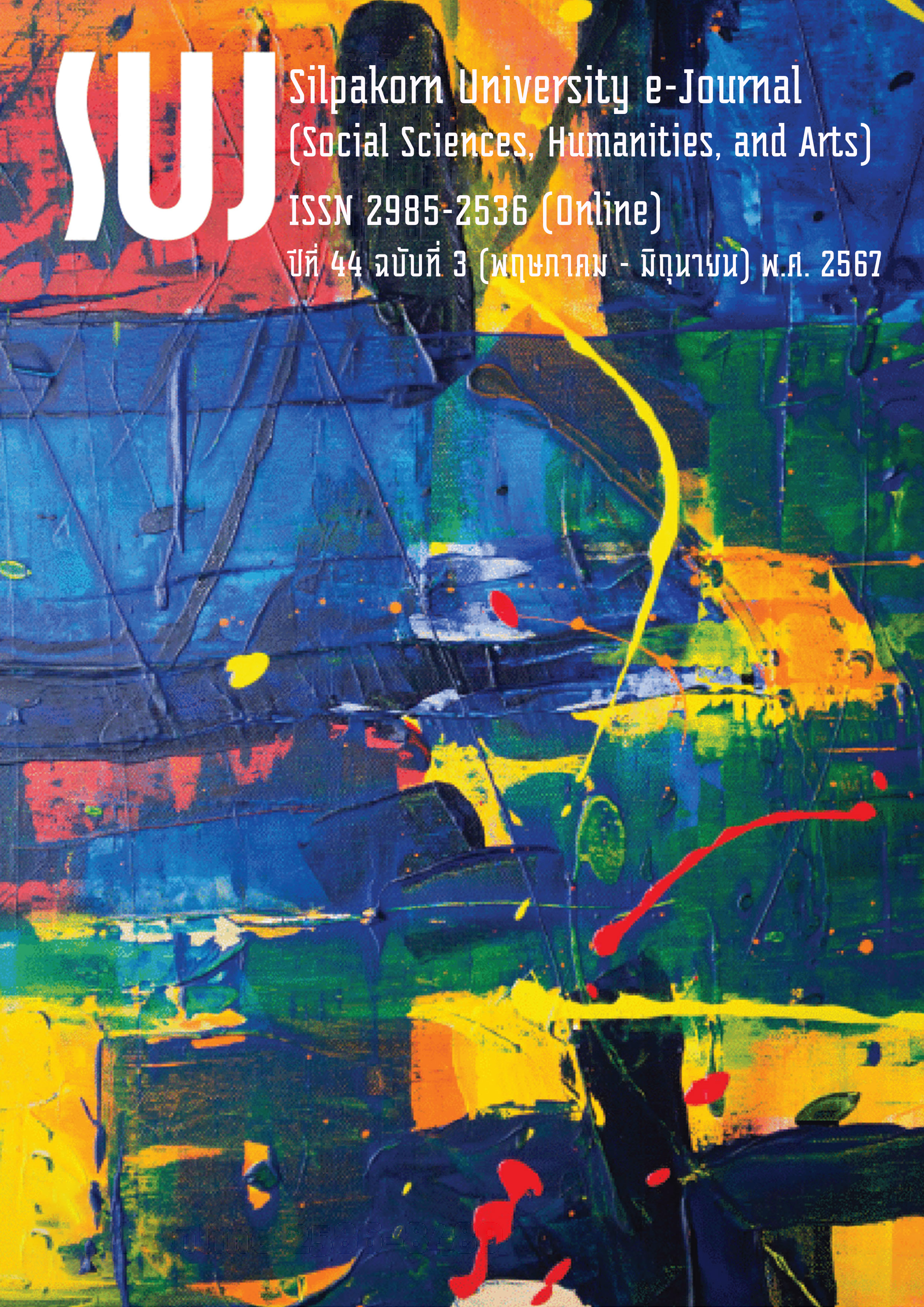บทบาทของผู้ประกอบการรุ่นใหม่ในการพัฒนาเศรษฐกิจ BCG รองรับเชียงรายเมืองท่องเที่ยวเชิงสร้างสรรค์ (The role of new generation entrepreneurs in developing the BCG economy to support Chiang Rai as a creative tourism city)
Main Article Content
Abstract
การวิจัยนี้ มีวัตถุประสงค์เพื่อ 1) ศึกษาบทบาทของผู้ประกอบการรุ่นใหม่ในการพัฒนาเศรษฐกิจ BCG 2) ถอดบทเรียนบทบาทของผู้ประกอบการรุ่นใหม่ในการพัฒนาเศรษฐกิจ BCG รองรับเชียงรายเมืองท่องเที่ยวเชิงสร้างสรรค์ โดยใช้ระเบียบวิธีวิจัยเชิงคุณภาพในผู้ให้ข้อมูลหลัก 25 คน ด้วยการสัมภาษณ์ การสังเกต และสนทนากลุ่ม วิเคราะห์อุปนัยเชิงเนื้อหา ผลการวิจัยพบว่า 1) บทบาทของผู้ประกอบการรุ่นใหม่ในการพัฒนาเศรษฐกิจ BCG จังหวัดเชียงราย ประกอบด้วยหน้าที่การผลิต บริการ และกระบวนการ มีบทบาทในการขับเคลื่อนเศรษฐกิจ BCG สามารถก่อให้เกิดการสร้างธุรกิจใหม่เป็นกิจกรรมสำคัญในการขับเคลื่อนเศรษฐกิจ สร้างรายได้ สร้างการเปลี่ยนแปลง และมีส่วนร่วมในการพัฒนาสังคม 2) การถอดบทเรียนบทบาทของผู้ประกอบการรุ่นใหม่ในการพัฒนาเศรษฐกิจ BCG รองรับเชียงรายเมืองท่องเที่ยวเชิงสร้างสรรค์ มีความเชื่อมโยงของลักษณะเมืองท่องเที่ยวเชิงสร้างสรรค์และการดำเนินธุรกิจจากบทบาทของผู้ประกอบการรุ่นใหม่ในการพัฒนาเศรษฐกิจ BCG ข้อเสนอแนะจากการวิจัยสามารถนำไปต่อยอดเพื่อการดำเนินงานส่งเสริมผู้ประกอบการอย่างเป็นระบบเพื่อพัฒนาองค์ความรู้ ทักษะ ประสบการณ์ รวมถึงหน่วยงานที่เกี่ยวข้องสามารถนำผลวิจัยไปประยุกต์ใช้ให้เกิดประโยชน์ต่อไป
The research has the following objectives: 1) to study the role of new generation entrepreneurs in developing the BCG economy, and 2) to extract lessons from the role of new generation entrepreneurs in developing the BCG economy to support Chiang Rai as a creative tourism city. A qualitative methodology was employed, involving 25 key informants through interviews, observation, focus group discussions, and inductive content analysis. The results of the research found that: 1) The role of new generation entrepreneurs in the economic development of the BCG in Chiang Rai Province includes duties related to production, services, and processes that drive the BCG economy. These entrepreneurs play a crucial role in creating new businesses, which are important activities for driving the economy, generating income, creating change, and participating in social development. 2) Lessons learned from the role of new generation entrepreneurs in BCG economic development to support Chiang Rai as a creative tourism city show a connection between characteristics of a creative tourism city and business operations driven by new generation entrepreneurs in BCG economic development. Research recommendations include systematically promoting entrepreneurs to develop knowledge, skills, and experience. Relevant agencies can apply these research results to enhance their effort.
Downloads
Article Details

This work is licensed under a Creative Commons Attribution-NonCommercial-NoDerivatives 4.0 International License.
References
Amphanthong, Pimpan. (2023). Snowball sampling in the carbon footprint research of unregistered populations in the Faculty of Science and Technology, Rajamangala University of Technology Suvarnabhumi, Suphanburi Campus (การเลือกตัวอย่างแบบสโนว์บอลในงานวิจัยคาร์บอนฟุตพรินต์ของประชากรแฝงในคณะวิทยาศาสตร์และเทคโนโลยี มหาวิทยาลัยเทคโนโลยีราชมงคลสุวรรณภูมิศูนย์สุพรรณบุรี). RMUTSB Academic Journal, 11(2): 159-171.
Aungsutheerakul, Poonnirun, Chamnantham, Saruth, & Wariphan, Phasavat. (2023). A guideline for promoting the potential of creative tourism in Chanthaburi Province (แนวทางการส่งเสริมศักยภาพทางการท่องเที่ยวเชิงสร้างสรรค์ในจังหวัดจันทบุรี). Santapol College Academic Journal, 9(2): 156-165.
Bumrungsilp, Titapa, Pakdeepinit, Prakobsiri, & Somchan, Suriya. (2018). A model of creative tourism for cultural preservation of the ethnic group in Srisaket Province (รูปแบบการท่องเที่ยวเชิงสร้างสรรค์เพื่อการอนุรักษ์วัฒนธรรมกลุ่มชาติพันธุ์ในจังหวัดศรีสะเกษ). Journal of Social Academic, 11(1): 30-42.
Cohen, L., Manion, L., & Morrison, K. (2000). Research Methods in Education (5th ed.). London: Routledge.
Designated Areas for Sustainable Tourism Administration (Public Organization) [DASTA]. (2022). DASTA Chiangrai (อพท. ท่องเที่ยวอย่างยั่งยืนเชียงราย). [Online]. Retrieved January 20, 2024 from https://www.dasta.or.th/th/microsite/dastaarea8
Photisawang, Yanin. (2022). The Implementation of BCG Model: A Case Study of Community Waste Management Center, Lam Hoei Subdistrict, Don Tum District, Nakhon Pathom Province (การนำนโยบายการขับเคลื่อนเศรษฐกิจ BCG Model ไปปฏิบัติ : กรณีศึกษา ศูนย์บริหารจัดการขยะรีไซเคิลชุมชน ตำบลลำเหย อำเภอดอนตูม จังหวัดนครปฐม). Master’s dissertation, Chulalongkorn University, Bangkok, Thailand.
Polmitr, Dolruedee, & Luanchamroen, Somchit. (2023). The challenges of entrepreneurship and success in the modern competition based on the creative economy concept (ความท้าทายของการเป็นผู้ประกอบการกับความสําเร็จในการแข่งขันยุคใหม่ตามแนวคิดเศรษฐกิจสร้างสรรค์). Journal of Management and Development Ubon Ratchathani Rajabhat University, 10(1): 271-284.
Rattanaphan, Katesinee, & Ingthaisong, Piyapong. (2023). Creating shared value with BCG economy model of Thai government (การสร้างคุณค่าร่วมด้วย BCG Economy Model ของรัฐบาลไทย). Journal of Innovative Media and Communication, Rajamangala University of Technology Thanyaburi, 2(1): 60-74.
Sawangjit, Witaeak, Charoenrat, Orawan, Lemtrakul, Wiyada, & Chaisongkram, Kanyarut. (2023). The lesson learned to enhance potential of creative community-based tourism based on local identity (การถอดบทเรียนการยกระดับศักยภาพการท่องเที่ยวโดยชุมชนเชิงสร้างสรรค์บนฐานอัตลักษณ์ท้องถิ่น). Panyapiwat Journal, 15(2): 164-176.
Tripopsakul, Suchart, & Pichyangkul, Chakrit. (2018). Factors influencing youth entrepreneurs in Thailand (ปัจจัยเชิงสาเหตุต่อการเป็นผู้ประกอบการรุ่นเยาว์ของประเทศไทย). NIDA Business Journal, 22: 44-60.
Wisudthiluck, Suddan. (2015). Knowledge on Creative Tourism: Manual and Practice Guidelines (องค์ความรู้ว่าด้วยการท่องเที่ยวเชิงสร้างสรรค์ : คู่มือและแนวทางปฏิบัติ). Pathum Thani: Faculty of Sociology and Anthropology, Thammasat University.


